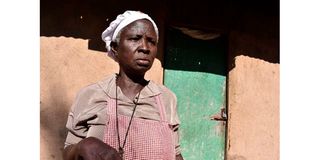Review Law of Succession Act to ensure justice for widows

Mary Nyalik from Ahero in Kisumu County who, together with her three children, was kicked out of the family home by her in-laws barely six months after her husband’s death in 2007.
What you need to know:
- There are still some areas of incongruence in the Succession Act.
- Nicknamed “the other woman section”, Section 3(5) recognises, as wives, women married to or by men who had no capacity to marry them by virtue of the Marriage Act.
- With the Marriage Act 2014, customary marriages are now officially recognised.
The enactment of the Matrimonial Property Act of 2013 and the review of the Marriage Act of 2014 augured hope that the family legal regime would be harmonised. This has not been the case as there are still some areas of incongruence in the Succession Act.
Although there are proposed changes (Amendment Bills 2019/2020), they still fall short. This creates a situation of piece-meal amendments, which leads to delay and forestalling of reforms of all sections that bleed inequalities.
Nicknamed “the other woman section”, Section 3(5) recognises, as wives, women married to or by men who had no capacity to marry them by virtue of the Marriage Act. It was introduced in 1981 to cure a situation in which men would marry under statutory law and proceed to procure marriage under customary law, or vice versa.
Upon their death, the women they had under customary law were denied inheritance. The fate of the customary wives was uncertain. Customary marriages were treated as inferior, for which no marriage certificates were issued. The aim of the section was to consider customary wives for succession.
Customary marriage
With the Marriage Act 2014, customary marriages are now officially recognised. The Act requires the registration of all unions. Those in customary marriages are now issued with certificates. With this development, there is a case for reconsidering Section 3(5).
With statistics showing most women favour monogamous marriages, this provision denies them the security in marriage. Upon the demise of their husbands, they are forced to share matrimonial property with persons unknown to the marriage.
Marriage is a voluntary union of a man and a woman whether in a monogamous or polygamous union. While men’s rights are guaranteed, women in monogamous unions are deprived of this choice and rights by the law as ideally, their marriages are converted from monogamous to polygamous upon the death of their husbands, for the purposes of succession.
Additionally, the section commissions bigamy. It’s manifestly clear that it’s discriminatory as it gives primacy to customary at the expense of the monogamous marriage.
The section should be abrogated and promote the registration of marriage as the best way to protect all women. Barriers to registration, especially customary marriages, should be identified. Section 40 deals with the distribution of the estate where the deceased was polygamous, died intestate and is survived by different spouses and children.
Equal partners
In the first instance, the personal and household effects of the deceased and the residue of the estate is distributed according to the houses. Here, a house comprises the children and their mother.
A widow is considered as a unit alongside the children, regardless of whether or not she had contributed to the acquisition of property. The implication of this is that it equates widows to children. They are treated like children notwithstanding having been equal partners in marriage. Worse, the first wife is relegated to the position of the last-born of subsequent wives.
Further, the first is relegated to the same position as subsequent widows who came after she had participated in the acquisition of the estate. The section has, therefore, led to serious injustice. It’s curious that it has evaded various attempts to amend the Act. It should be reviewed to ensure distribution of the estate takes into account the contribution of the first wife.
Also, Section 50 (1) limits appeal of decisions from the magistrate’s court. The decisions of the High Court are final and cannot be appealed to the Court of Appeal. This section limits access to justice.
Single judge
Succession disputes often include land, which lies at the heart of social and economic life of most Kenyans. With the amendment to the magistrates’ court Act in 2015, they were accorded jurisdiction to hear and determine any dispute in respect of all estates whose gross value does not exceed Sh20 million, including revocation or annulment of the grants issued by the court.
With this expansion of jurisdiction, the stakes have been raised. It is unreasonable to allow the decision of a single judge as final, and limit the right of appeal to the High Court. With Article 48 now articulating the right of access to justice for all persons is paramount, this section should be reviewed.
Ms Amendi is an Advocate of the High Court.





